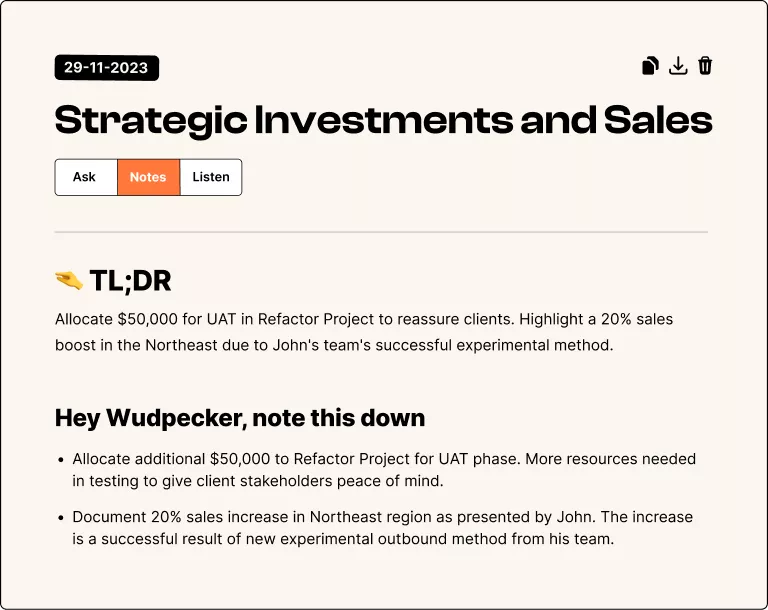Want to learn the best business insights from remarkable speakers at Slush 2023, but don’t have the time to watch the full speeches on YouTube?
You’ve come to the right place. Below is a summary of a conversation between Corinne Riley (Investor of Greylock), Donald Stalter (Partner of GFC), Natalie Vais (General Partner of Spark Capital) and Mark Bergen (Bloomberg).
(psst: the notes were automatically generated with Wudpecker's AI notetaking tool. If you'd like to check these notes + transcript + audio recording without needing to log in, press here.)
<p class="h1-rich">🤏 TL;DR</p>
Investors discussed recent investments in AI companies and the challenges of AI investing, including filtering out promising opportunities and understanding the long-term impact of AI. They also talked about the infrastructure vs. application layer, talent and compute challenges, regulatory considerations, misconceptions and irritations in AI, investment criteria and challenges, and predictions and outlook.
<p class="h1-rich">✨ Summary</p>
AI Investment Landscape
- Donald Stalter from Global Founder Capital discussed their recent investment in Slope, a B2B payments business that leverages AI for KYC and payment optimization.
- Corinne Riley from Greylock mentioned their investment in Baseten, a company that provides infrastructure for scalable and performant model deployment.
- Natalie Vais from Spark Capital talked about her prior investment in PostgresML, a company that brings ML models into databases.
Challenges of AI Investing
- There is a high volume of pitches in the AI space, making it challenging to filter out the most promising opportunities.
- Investors are trying to figure out the long-term impact of AI on different industries and the role of AI in each company's business model.
- There is uncertainty about what will happen when the AI "dust settles" and how different layers of AI (model, infrastructure, application) will be affected.
Infrastructure vs. Application Layer
- The infrastructure layer focuses on tools and technologies that help serve, modify, and deploy AI models within a company.
- The application layer includes various use cases, from GPT wrappers to incumbent companies adopting AI within existing workflows.
- The model layer involves investments in language models and private model companies like Inflection and OpenAI.
Talent and Compute Challenges
- Talent for AI is expensive but also more accessible due to layoffs and remote work opportunities.
- Startups need to consider both the cost and access to GPUs for their AI compute needs.
- The talent pool for AI is expanding, and the knowledge required to work with AI is becoming more accessible to software engineers.
Regulatory Considerations
- Regulatory concerns are not a primary focus at the pre-seed and seed stages, but startups need to address safety, security, privacy, and ethical guidelines as they grow.
- Regulations and ethical considerations can have an impact on startups, especially as they scale and face challenges in compliance and product development.
Misconceptions and Irritations in AI
- One misconception is that AI has suddenly emerged, while in reality, it has been a decade-long process of research and development.
- Founders should focus on building real businesses and solving practical problems rather than chasing science fiction or shiny objects.
- Startups should teach investors something new and challenge their perspectives, rather than conforming to predefined themes or the expected narrative.
Investment Criteria and Challenges
- Investors look for founders who can solve customer problems and have a deep understanding of the space they operate in.
- Finding the right balance between technical expertise and sales acumen is crucial for early-stage AI startups.
- Startups need to build strong teams and demonstrate the ability to deliver value to customers while adapting to changing market conditions.
Predictions and Outlook
- Panelists believe that new big AI companies will emerge in the next five years, but there may also be AI unicorns that fail to survive.
- The AI investment landscape will continue to evolve, and investors need to stay ahead of research developments and market trends.



.svg)



.jpg)

%20-%20How%20to%20Build%20Your%20Revenue%20Streams%20_%20Slush%202023.png)

%20%26%20Chris%20Bischoff%20(General%20Catalyst).png)
%20%26%20Iain%20Martin%20(Forbes).png)


%20%26%20Seth%20Bannon%20(Fifty%20Years).png)
%20Tom%20Wehmeier%20_%20Slush%202023.png)
%20Cal%20Henderson%20%26%20(Coatue)%20Sarah%20Cannon%20_%20Slush%202023.png)
%20in%20the%20City%20(Helsinki)%20_%20Caroline%20Spiegel%20(Quinn)%20%26%20Kia%20Kokalitcheva%20(Axios).png)


%2C%20Cosmo%20Feilding%20Mellen%20(Beckley%20Psytech).png)


.svg)
